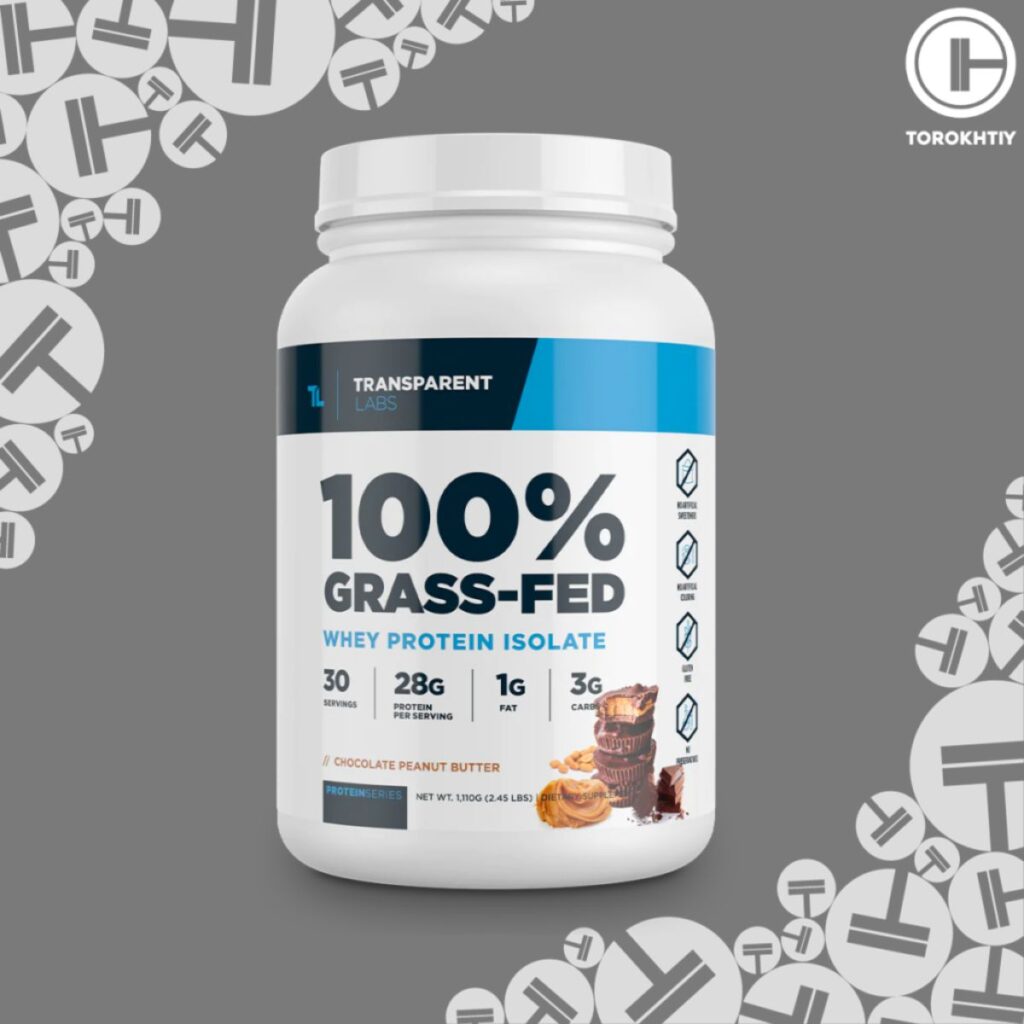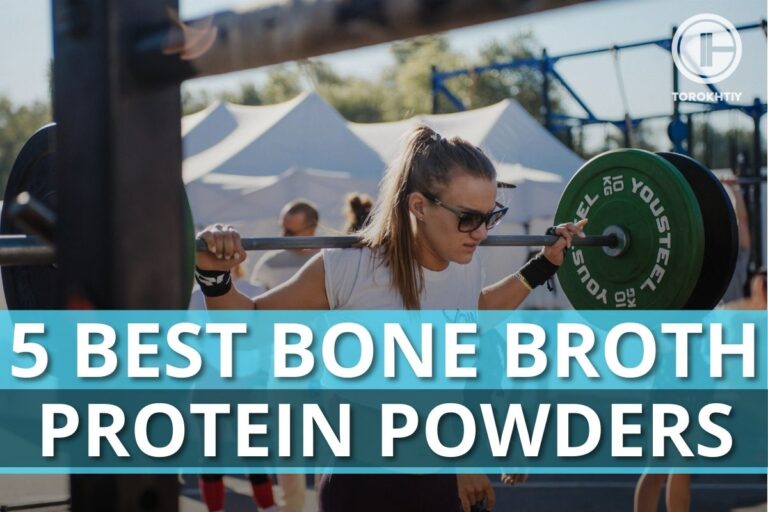Whey vs Plant Protein: How Do They Compare?
Looking to try out a protein powder but unsure what type to buy? With plenty of options on the market, making an informed choice can be difficult. You may be wondering whether to buy whey or plant-based protein. There’s plenty of factors that should go into your decision between whey vs plant protein, so we’ll be going in-depth on both protein types in this article. Keep reading to have all your questions about whey and plant protein answered.
The difference between whey vs plant protein will largely come down to protein and carb content. Whey protein will typically have significantly more protein per serving and a more pleasant texture, making it the better option for non-vegans. However, if you are vegan, plant protein is an excellent substitute.
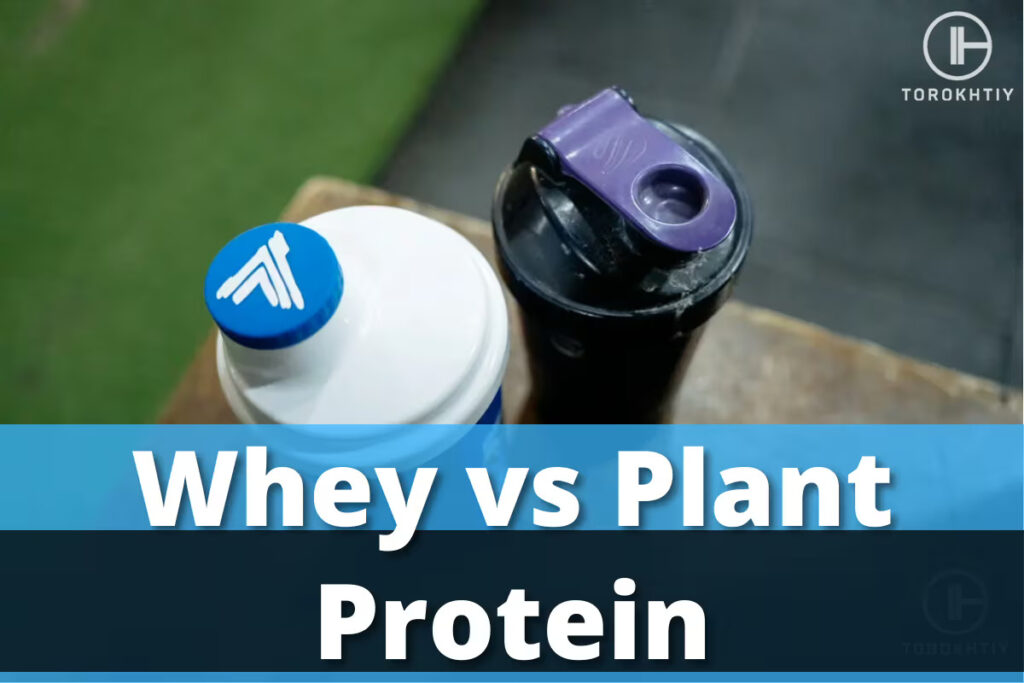
What Is Whey Protein?
Whey protein is a powder derived from milk. So, if you were wondering “is whey protein plant-based?”, the answer is no. There are 2 kinds of protein found in milk: whey and casein. Both are commonly dried and sold as protein powders, with whey being the more common of the 2. Whey protein is a complete protein as it contains all 9 essential amino acids that you need to get through your diet.
There are typically 2 types of whey proteins: concentrates and isolates. The difference between the 2 comes down to a matter of purity. Isolates are the more refined of the 2 proteins, typically containing more protein, and less fats and carbohydrates. This is ideal for those on a cut, or anybody looking to minimize the calories in their protein powder. Isolates are also typically very low in lactose, making them largely suitable for lactose-intolerant people. Isolates typically have a protein concentration of around 90%. Keep in mind that isolates will typically be more expensive than concentrates.
Concentrates on the other hand are a less refined form on whey. They will contain slightly more fats, carbohydrates, and lactose. These are usually around 80% protein. Because of their higher calorie count, concentrates are better suited to those bulking, or maintaining weight. If someone is serious about bulking, they may be more interested in a mass gainer rich in carbs instead of a simple concentrate.
There’s a fairly wide range of protein contents found in different whey supplements. However, most whey supplements will have anywhere from 20-40g of protein in each serving. It’s worth noting that most people don’t necessarily need a protein supplement to hit their daily protein goals if they make conscious choices. However, they are a quick and easy way to get a little extra hit of protein in especially when your needs are higher, and a versatile ingredient for baking and cooking.
What Is Plant Protein?
Plant protein is protein powder derived from a plant source instead of an animal-based source like milk. While whey refers to a specific form of milk protein, the term plant protein is much broader.
There are numerous different product types that fall under the banner of plant proteins. These include soy, brown rice, pea, hemp, and many more! Plant proteins are most commonly sold as a blend containing several of these ingredients. This is usually done to make up for the fact that most plant sources do not contain all 9 essential amino acids in good doses. By combining several protein sources, plant protein blends are often complete proteins.
Plant proteins typically won’t have the same high protein content as dairy-based proteins, although there are some exceptions to this rule. However, it is much more common to see plant proteins in the 15-20g range, even if there are some that offer up to 30g of protein per serving.
Of course, it may go without saying that plant proteins are completely vegan-friendly, making them a great option for those following plant-based diets. Many vegans may struggle to get protein in their diet, especially if they’re trying to put on muscle. It’s worth noting that getting protein on a vegan diet isn’t as big of an issue as many people believe, although a plant-based protein powder is still an easy way for vegans to ensure they’re getting enough protein every day.

Whey vs Plant Protein
So, is whey or plant protein better? Whey and plant protein are ultimately very similar products. They tend to come at similar price points, although you can find some plant proteins for much cheaper than whey. Also, in recent years, vegan protein powders have begun to be much higher-quality, with their taste and macro breakdown often being able to rival that of whey protein. However, there are still plenty of plant proteins available that don’t have nearly as much protein, or the smooth texture of whey. It’s worth noting that plant protein is also less bioavailable when compared to whey, making this protein difference even more significant.
So, overall, whey protein will be the better option for most people comfortable with consuming dairy. Here are the main factors we’ve compared vegan vs whey protein on in more detail.
| Criteria | Whey Protein | Plant Protein |
|---|---|---|
| Macronutrient Breakdown | Typically will have 20-40g of protein per serving with minimal fats and carbs. | Will usually have 15-20g of protein per serving with slightly higher fat and carb content than whey. |
| Taste & Texture | Rich, milkshake-like texture and flavor. | High-quality products can rival whey in taste and texture, but lower quality supplements can be quite unpleasant. |
| Price | Will typically be around $1.00-2.00 per serving | Can range from $0.50-2.00 per serving, but lower price products will usually be lower quality. |
| Vegan-Friendly | Made from dairy so it is not vegan-friendly. | Entirely plant-based and largely designed with vegans in mind. |
1. Macronutrient Breakdown
In terms of their typical macronutrient breakdowns, whey protein is usually far superior to plant-based proteins.
With whey protein, you can usually expect anywhere from 20-40g of protein in each serving. Especially with isolates, you can also expect very low carbohydrates and fats making them ideal for cutting. You can also be certain all whey proteins are complete proteins containing all 9 essential amino acids.
Plant proteins on the other hand tend to have significantly lower protein contents. While you can find plant proteins with up to 30g of protein per serving, it’s much more common to find them with around 15-20g. Plant proteins will typically have slightly higher carbohydrate content than whey protein, so they usually aren’t ideal for cutting. Also, while most blends are complete proteins, many single-source plant proteins do not contain high enough amounts of all 9 essential amino acids to be considered complete. It’s also worth noting that plant proteins will have worse bioavailability than whey, making the difference in protein content even more significant.
Overall, if you’re concerned about maximizing your protein intake, then whey protein is definitely the better option.
2. Taste & Texture
Similar to the macronutrient breakdown, if you’re concerned about taste and texture, whey protein will typically be a better choice.
Whey protein is well-known for having a smooth milkshake-like texture, which is likely why it’s so popular compared to other proteins. Whey will typically mix smoothly with either milk or water for a rich, creamy shake.
Plant protein on the other hand, isn’t usually as delicious. While most plant proteins have improved over recent years, it’s still fairly common to get a plant protein with a gritty texture, or a somewhat unpleasant taste. With this being said, the more high-quality plant proteins have a taste and texture that closely rivals whey.
Although plant proteins can certainly be delicious, on average whey proteins have a much more enjoyable taste and texture.
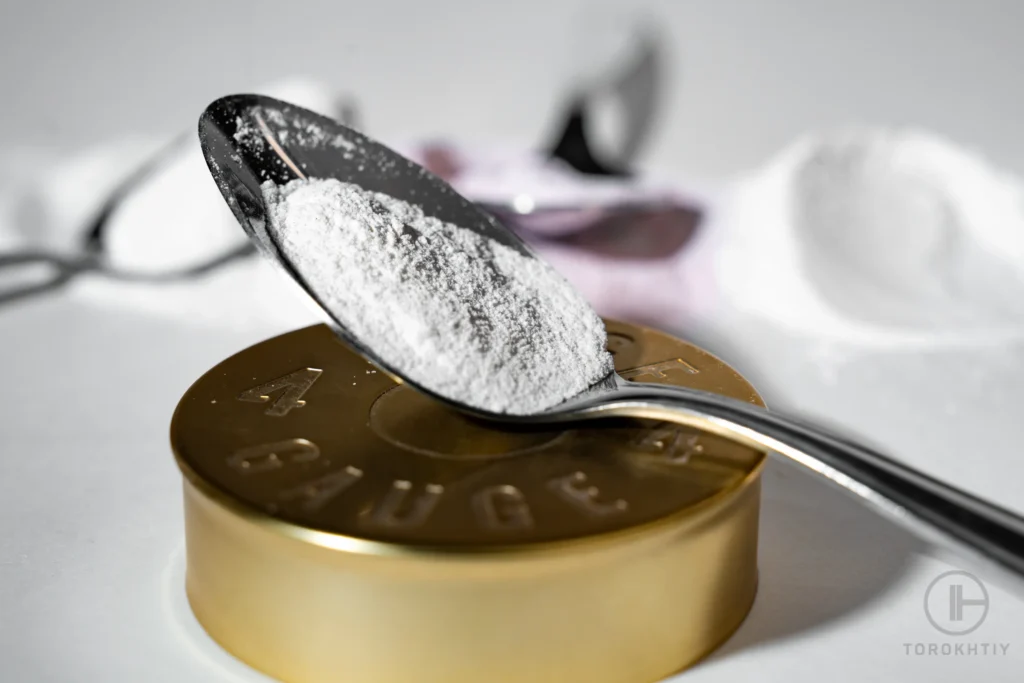
3. Price
This is the area where whey and plant proteins are the most competitive. Prices vary greatly from product to product, leaving these 2 protein types about even in terms of cost on average. However, with Plant Protein often having a lower total protein content with less bioavailability, whey protein will have better value for the money.
Based on the 2 products we covered below, high-quality whey and plant-based proteins will have very similar prices (both products are just about $2 per serving). While you can find plant-based proteins with very low price tags, these will usually be products with either poor macros, or an unpleasant taste and texture. If you’re looking to buy a plant protein, we recommend spending a bit of extra money to make sure you’re getting a high-quality product.
Overall, in terms of price for a high-quality product, plant and whey proteins are very similar to each other. However, because of protein content and bioavailability, whey protein will very often offer much better value for your money.
4. Vegan-Friendly
Of course, this is the one area where plant proteins are undeniably superior to whey.
With whey being derived from dairy, it is not vegan friendly. If any vegans are looking for a protein powder, they will have to pick a plant-based protein 100% of the time. Luckily, there are plenty of high-quality options available that rival the quality of whey.
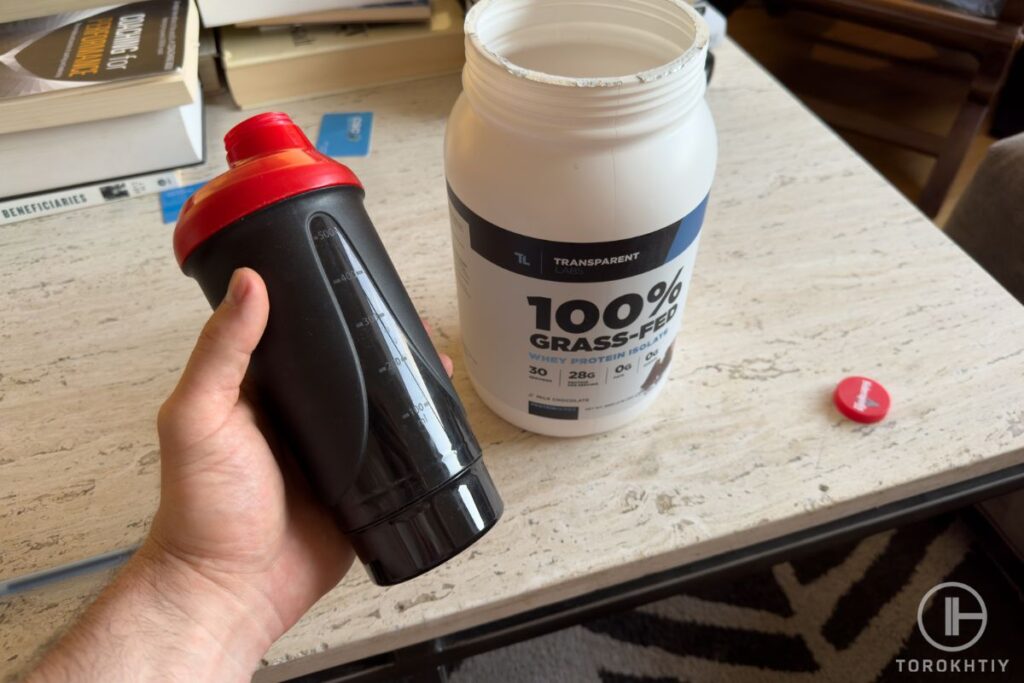
Whey vs Plant Protein: Summary
Is whey protein better than plant protein? While this is a matter of personal preference, and whey and plant proteins are very similar products, overall whey is a superior option in many ways.
This is because it typically offers more protein per serving, is more bioavailable, and has a more pleasant taste and texture. With this being said, a high-quality plant protein can rival whey in both of these factors. However, there are many lower-quality plant proteins out there with poor macro breakdowns, and an unpleasant taste and texture as well.
In terms of price, both products are very similar. Although you can find very cheap plant proteins, you’ll usually be sacrificing either macros or taste for such a low cost.
Finally, although it probably goes without saying, plant proteins are completely vegan-friendly, while whey protein is not. This makes plant-based protein a far superior option for anybody on a plant-based diet.
If you’re wondering “is plant protein as good as whey?”, the short answer is no, but both products are very similar in many ways. However, when considering plant vs whey protein, whey is ultimately a better choice for the majority of people.
Pros/Cons of Whey Protein
Positives:
Could be better:
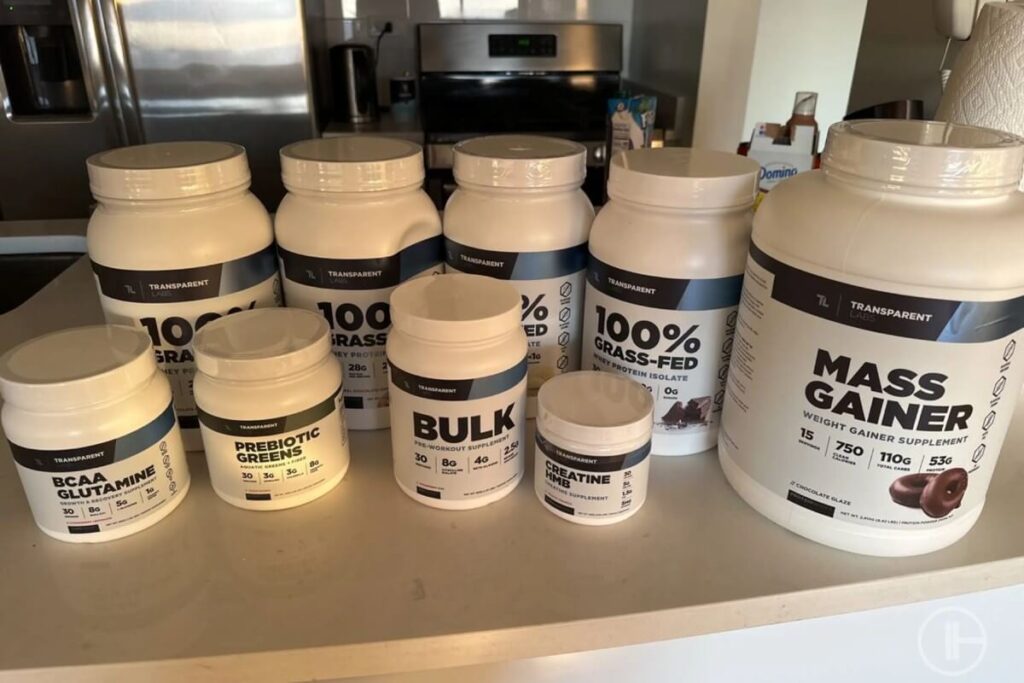
Pros/Cons of Plant Protein
Positives:
Could be better:
Whey vs Plant Protein When to Use Each?
Best Whey Protein
Transparent Labs’ 100% Grass-Fed Whey Protein Isolate
- Serving Size: 32.96 grams
- Price Per Serving: ~$1.8
- Protein Percent Of Weight (%): 85%
- Proteins: 28 grams
- Carbohydrates: 1 gram (depends on flavor)
- Fat: 0.5 gram (French Vanilla only)
- Added Sugar: 0 gram
- Calories Per Serving: 120
- Recommended By Athletes: Hafþór Júlíus Björnsson, Terron Beckham, Paul Sklar
Our top pick for a high-quality whey protein comes from Transparent Labs. If you’re familiar with this brand, then they likely need no introduction. Transparent Labs is one of the leading supplement producers for their constant commitment to making some of the best supplements available. This protein powder is no exception.
As you can see from the product’s name, this is a whey isolate, meaning it has an exceptionally high protein concentration. This product is made up of 85% protein by weight, having 28g of protein in a 33g scoop. At only 120 calories and 28g of protein, Transparent Labs has a stellar 93% protein concentration by calories. The other 7% is made up of a single gram of carbs, making this an ideal protein powder for cutting.
While many protein powders only come in 2 standard flavors like chocolate or vanilla, Transparent Labs offers 12 unique flavors. These include Cinnamon French Toast, Mocha, and Strawberry, ensuring there will be something for everybody. If you prefer your protein flavorless, they also have a completely unflavored option available.
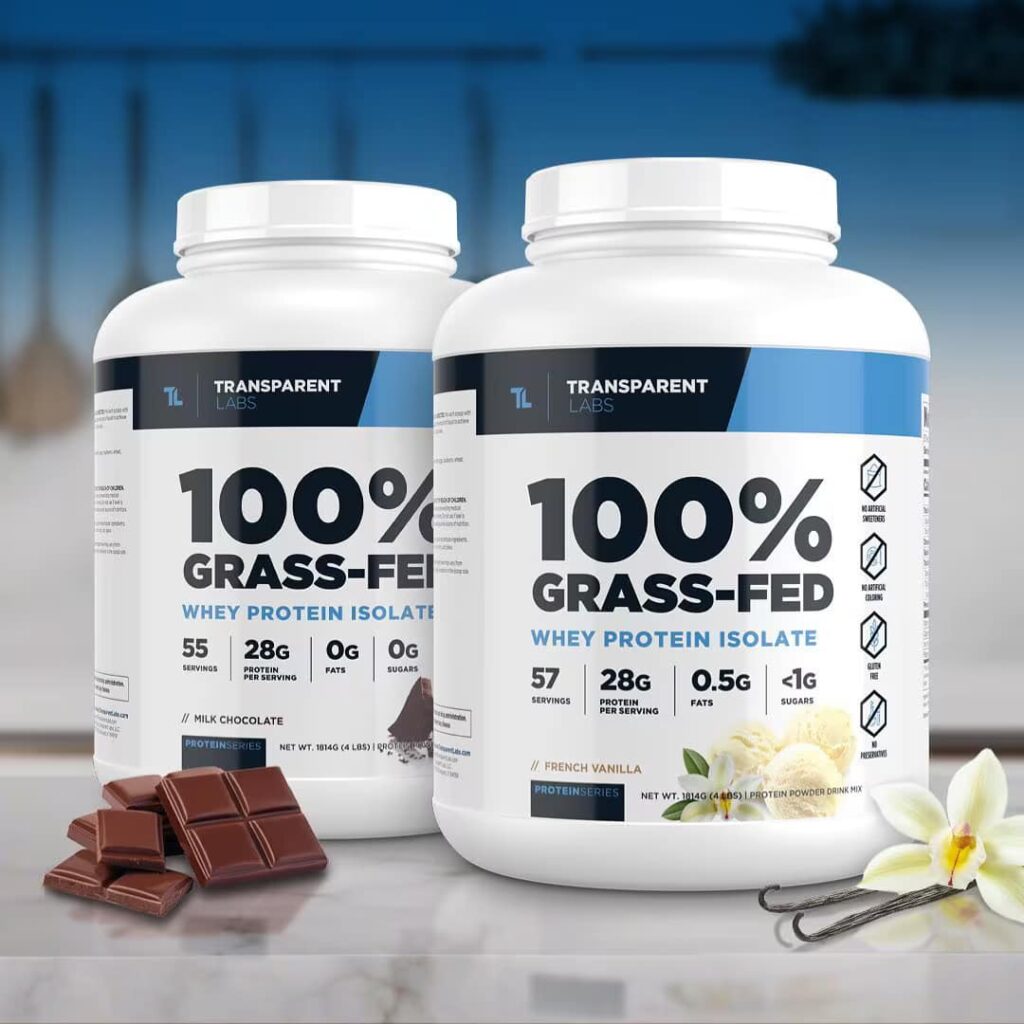
Like all of Transparent Labs products, this product features no artificial ingredients whatsoever. That means no artificial sweeteners, coloring, preservatives, or GMOs. This is a simple formula made up of whey protein, natural flavoring, and nothing else. This is also made from high-quality grass-fed milk, which has been shown to be healthier than non-organic dairy.
It’s worth noting that this is a fairly expensive whey protein compared to some other products on the market. At around $2 per serving, there are definitely plenty of cheaper options out there. Just keep in mind this is one of the highest quality whey supplements available, making the price well worth it.
Best Plant Protein – Future Kind Vegan Protein Powder
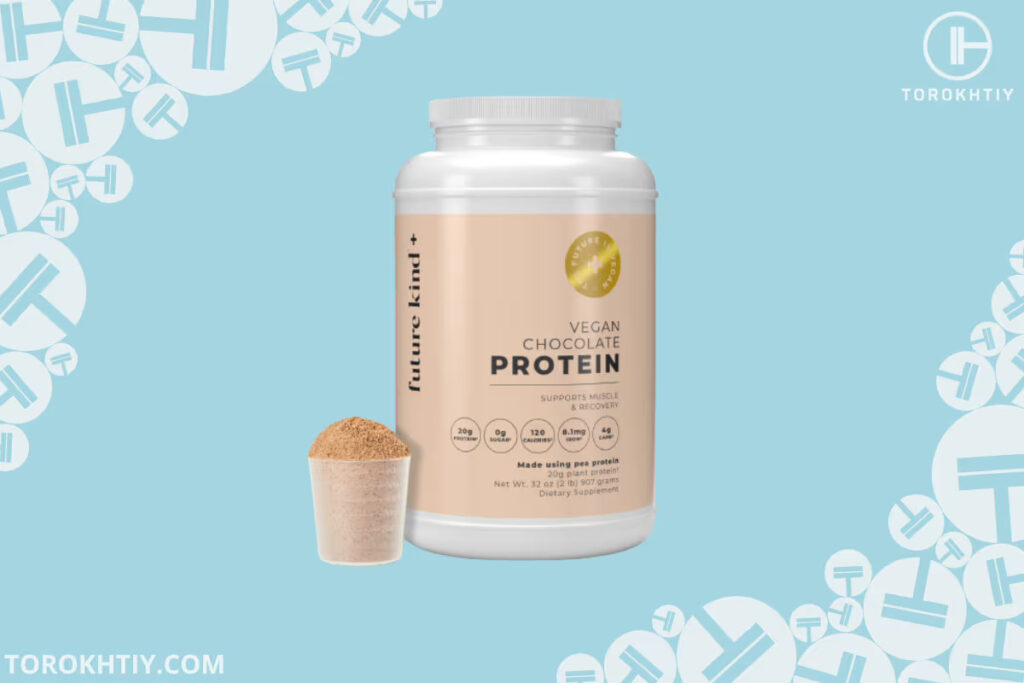
Next, our pick for the best plant-based protein available is Future Kind’s Vegan Protein Powder. While it doesn’t have the same super high protein content as Transparent Labs product, this is still an excellent alternative for vegans and those looking to try a plant-based protein supplement.
As we mentioned, this doesn’t have the same high-protein content as Transparent Labs, but it is still solid for a vegan shake with 20g of protein per serving. With 20g of protein in a 30g scoop, Future Kind is 67% protein by weight. At 120 calories, it has an 83% protein concentration, which is great for a plant-based protein. The rest of its macros are made up of 3g of fat and 4g of carbs. Future Kind’s product also has 3g of dietary fiber, and 45% of your daily iron intake (Transparent Labs has 0g of fiber and only 6% of daily iron intake, for comparison).
Future Kind only offers its protein in 2 standard flavors: chocolate and vanilla. However, reviews suggest that this is some of the smoothest and best tasting vegan protein available.
Similar to Transparent Labs, this product is also made with completely natural ingredients, containing no artificial sweeteners, dyes, or preservatives. Its vegan protein blend – made up primarily of pea, and hemp – is also a complete protein containing all 9 essential amino acids.
Future Kind also has the same price as Transparent Labs at around $2 per serving. While this is certainly expensive for a vegan protein, as we said in our Transparent Labs review, you can be confident you’re getting a high-quality product for your money.
FAQ
What Is the Best Form of Protein?
In our opinion, the best form of protein is whey isolate for its high concentration of 80-90%. This makes it ideal for those looking to use a protein powder for dieting. Its high protein concentration also makes it largely lactose-free. While it is a bit pricier than whey concentrate, it’s a much higher quality form of whey protein. Our pick for the best whey isolate on the market is Transparent Labs Whey Protein Isolate.
Is Plant Protein Equivalent to Whey Protein?
In many ways (not all), plant protein and whey protein are fairly the same. However, lower quality plant proteins tend to have worse taste, texture, or macros, meaning whey proteins are usually a safer option on average. Of course, for vegans, plant-based protein powders will be the far superior option. Ultimately, the difference between whey and plant protein comes down to a matter of personal preference.
Can You Build Muscle With Plant Protein?
Absolutely – this study suggests that plant protein blends can be as effective as whey at increasing muscle protein synthesis as long as they have similar amino acid profiles, however there are some small differences in other aspects. With many plant proteins containing around 20g of complete protein, they are a great way for vegans to get some extra protein throughout the day, helping to build some high-quality muscle. Just remember that not all plant-based proteins are created equally. You’ll ideally want to find a blend that contains all 9 essential amino acids, with a solid amount of protein in each serving. If you’re looking for a great plant protein, we recommend Future Kind Vegan Protein Powder.
Is Vegan Protein Powder Good for You?
Yes! Many vegans struggle to get enough protein in, especially if they’re trying to put on muscle. This makes vegan protein powders an easy way to do so. Especially with many vegan protein powders being made of completely natural ingredients, they are a great way to get some extra protein in your diet.
Conclusion
Overall, plant-based and whey protein powders are very similar products that serve slightly different purposes. Whey protein is likely superior because of its higher protein content and better bioavailability. However, if you are vegan, plant-based powders are a solid alternative. All in all, whey proteins have better macros, bioavailability, taste, and texture on average. With that being said, there’s nothing wrong with using plant-based protein powder as an alternative, especially if you’re vegan.
Our top pick for a high-quality whey protein is Transparent Labs Whey Protein Isolate, and our pick for the best vegan protein is Future Kind Vegan Protein Powder.
Have you tried either of the products listed above? What’s your opinion on the difference between whey and plant-based proteins? We’d love to hear your thoughts in the comments below!
Also read:
- Casein vs Whey Protein
- Soy Protein vs Whey
- Does Protein Make You Poop
- Can You Drink Protein Shakes Without Working Out
- What to Mix Protein Powder With
- Best Protein Powder for Smoothies
- Best Lactose Free Protein Powder
- Best Creatine for Women
- Best Post Workout Snack
References:
- “Protein and Amino Acids” National Library of Medicine, (1989), 23(3):827-35.
- Janis Cerbulis, John H. Woychik, and M. Valerie Wondolowski, Composition of commercial wheys (American Chemical Society, 1972), 20, 5, 1057–1059, https://pubs.acs.org/doi/pdf/10.1021/jf60183a015.
- Sarah Marrs, Christy Wilson, Vegan Protein Sources (CAMPUS HEALTH SERVICE, 2016).
- Brad Heins, “Grass-fed cows produce healthier milk,” University of Minnesota Extension, http://surl.li/kvogd (accessed 2021).
- Philippe J M Pinckaers, Imre W K Kouw, Stefan H M Gorissen, Lisanne H P Houben, Joan M Senden, Will K H W Wodzig, Lisette C P G M de Groot, Lex B Verdijk, Tim Snijders, Luc J C van Loon “The Muscle Protein Synthetic Response to the Ingestion of a Plant-Derived Protein Blend Does Not Differ from an Equivalent Amount of Milk Protein in Healthy Young Males” National Library of Medicine, (Jan 14, 2023), 152(12):2734-2743.
Why Trust Us?
With over 20 years in Olympic Weightlifting, our team does its best to provide the audience with ultimate support and meet the needs and requirements of advanced athletes and professional lifters, as well as people who strive to open new opportunities and develop their physical capabilities with us.
By trusting the recommendations of our certified experts in coaching, nutrition, dietology, and sports training programming, as well as scientific consultants, and physiotherapists, we provide you with thorough, well-considered, and scientifically proven content. All the information given in the articles concerning workout programming, separate exercises, and athletic performance, in general, is based on verified data. We ensure that you can rely on our professionals’ pieces of advice and recommendations that can be treated as personalized ones which will benefit you and fully meet your needs.
The product testing process is described in more detail here
Author: Jacek Szymanowski
Certified Nutritionist,
M.Sc.Eng. Biotechnology
Performance Architect,
Strength and Conditioning Specialist
With over 30 years of fighting experience, specialization in nutrition coaching for athletes, and expertise in metabolic health and dietary strategies, Jacek offers a comprehensive approach to optimizing your performance and well-being. Backed by a Master of Science degree in Biotechnology, Jacek remains at the forefront of scientific advancements, ensuring that his coaching is always evidence-based and up-to-date.

